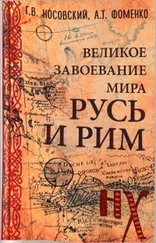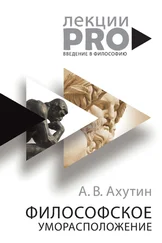348
Montuori M. John Locke on Toleration and the Unity of God. – Amsterdam: J. C. Gieben Publishers, 1983. P. XLI.
349
Popple W. A Rational Catechism: or an Instructive Conference between a Father and a Son. – London, 1687.
350
Popple W. Three letters tending to Demonstrate how the Security of this Nation against all Future Persecution for Religion lys in the Abolishment of the Present Penal Laws… and the Establisment of a New Law for Universal Liberty of Conscience. – London, 1688.
351
Popple W. A letter to M-r Penn. – London, 1688.
352
Popple W. A Discourse of Human Reason with relation to matters of Religion. – London, 1690.
353
Clifford M. A Treatise of Humane Reason. – London, 1674.
354
Клуб был назван «Dry» («трезвым») для того, по-видимому, чтобы подчеркнуть серьезность обсуждавшихся вопросов. См.: Coudert A. P . John Locke and Francis Mercury van Helmont // Everything Connects: in Conference with Richard H. Popkin: Essays in His Honour / Ed. by J. E. Force and D. S. Katz. – Leiden; Boston; Koln: Brill. 1999. P. 91.
355
Например, членом клуба был пресвитерианский пастор и ятрохимик Даниел Фут, в 1680-е гг. выполнявший функции личного секретаря ван Гельмонта. По мнению Аллисон Кудерт, Попль мог познакомиться с Локком через ван Гельмонта. См.: Coudert A. P . John Locke and Francis Mercury van Helmont // Everything Connects: in Conference with Rich ard H. Popkin: Essays in His Honour / Ed. by J. E. Force and D. S. Katz. – Leiden; Boston; Koln: Brill. 1999. P. 91.
356
См.: Montuori M. John Locke on Toleration and the Unity of God. – Amsterdam: J. C. Gieben Publishers, 1983. P. XXXVIII.
357
См.: Locke’s Travels in France, 1675–1679: As related in his Journals, Correspondence & other papers / Ed. by J. Lough. – Cambridge: Cambridge University Press, 1953.
358
Long Th. The Letter for Toleration Decipher’d, and the Absurdity and Impiety of an Absolute Toleration Demonstrated, by the Judgement of the Presbyterians, Independents, and Mr. Calvin, Mr. Baxter, and the Parliament. – London, 1689. См.: Yoltonjean S. John Locke: A Descriptive Bibliography. – Bristol: Thoemmes Press, 1998. P. 1, 439.
359
Goldie M. Religious Intolerance in Restoration England // From Persecution to Toleration: The Glorious Revolution and Religion in England / Ed. by O. P. Grell, J. I. Israel and N. Tyacke. – Oxford: Clarendon Press, 1991. P. 345.
360
[ Long Th. ] A Resolution of Certain Quaeries concerning Submission (1689); [ Long Th. ] Refl ections on a Late Book Entitled the Case of Allegiance Consider’d (1689); [ Long Th. ] A Full Answer to All the Popular Objections that have yet Appeared for not Taking the Oath (1689); [ Long Th. ] The Historian Unmask’d (1689).
361
Popple W. A Discourse of Human Reason with relation to matters of Religion. – London, 1690. P. 94.
362
См.: Robbins C. Absolute Liberty: The Life and Thought of William Popple, 1638–1708 // The William and Mary Quarterly. Third Series. 1967. Vol. 24. No. 2. P. 190, 205.
363
Locke J. An Essay concerning Human Understanding / Ed. by P. H. Nidditch. – Oxford: Clarendon Press, 1979. P-55Q.
364
Marshall J. John Locke, Toleration and Early Enlightenment Culture. – Cambridge: Cambridge University Press, 2006. P. 142.
365
Montuori M. John Locke on Toleration and the Unity of God. – Amsterdam: J. C. Gieben Publishers, 1983. P. 169.
366
Goldie M. Locke, Proast and Religious Toleration // The Church of England, c . 1689 – c. 1833: From Toleration to Tractarianism / Ed. by J. Walsh, C. Haydon and S. Taylor. – Cambridge: Cambridge University Press, 1993. P. 144.
367
Ibid. P. 633.
368
Ibid. P. 647.
369
Ibid. Р. 689.
370
The Correspondence of John Locke. Vol. V III / Ed. by E.S. de Beer. – Oxford: Clarendon Press, 1989. P. 426.
371
The Correspondence of John Locke. Vol. Ill / Ed. by E.S. de Beer. – Oxford: Clarendon Press, 1978. P. 647–648.
372
Locke J. A Letter concerning Toleration and Other Writings / Ed. by M. Goldie. – Indianapolis: Liberty Fund, 2010. P. 58–59. Голди замечает, что во французском издании 1710 г., хотя и ориентировавшемся на английский перевод, этот список приводился по латинскому варианту и возвращал тем самым исходный контекст.
373
Simonutti L. Limborch, Philippus van, 1633–1712 // The Continuum Companion to Locke / Ed. by S.J. Savonius-Wroth-Wroth, P. Schuurman, J.Walmsley. – London – N.Y.: Continuum International Publishing Group, 2010. P. 66; Simonutti L. Political Society and Religious Liberty: Locke at Cleves and in Holland // British Journal for the History of Philosophy. 2006. Vol. 14. No. 3.
374
См.: Claydon Т. Europe and the Making of England, 1660–1760.—Cambridge: Cambridge University Press, 2007. P. 25–28.
375
The Correspondence of John Locke. Vol. I / Ed. by E.S. de Beer. – Oxford: Clarendon Press, 1976. P. 228.
376
«Epistola de Tolerantia» точнее было бы переводить как «Послание о толерантности достославному мужу», или, буквально, «мужу ясновельможному», а еще точнее, учитывая, что vir clarissimus – не что иное, как один из титулов Римской империи, указывающий на принадлежность к сенату, – как «Послание о толерантности клариссиму». Это и другие подобные ему обращения неоднократно встречаются в письмах Локка к Лимборху, как если бы существовала некая система обращений, в которую была вовлечена определенная группа лиц, в том числе леди Машем и Лимборх. См.: Turnbull G.H. Samuel Hartlib: A Sketch of His Life and His Relations to J. A. Comenius. – Oxford: Oxford University Press, 1920. P. 14.
377
Cranston M. John Locke: A Biography. – London: Longmans, Green and Co, 1968. P. 321.
378
Marshall J. John Locke, Toleration and Early Enlightenment Culture. – Cambridge: Cambridge University Press, 2006. P. 160.
379
Ibid. Р. 484.
380
Simonutti L. Political Society and Religious Liberty: Locke at Cleves and in Holland // British Journal for the History of Philosophy 2006. Vol. 14. No. 3. P. 427.
381
ZagorinP. How the Idea of Religious Toleration Came to the West. – Princeton and Oxford: Prenceton University Press, 2003. P. 165–167.
382
TyackeN. Aspects of English Protestantism: c. 1530–1700.—Manchester and New York: Manchester University Press, 2001. P. 156.
383
Разумеется, такое понимание кальвинизма не может считаться его определением и требует корректировки, поскольку высказывалось в контексте острого и политического противостояния начала XVII в.
Читать дальше
Конец ознакомительного отрывка
Купить книгу
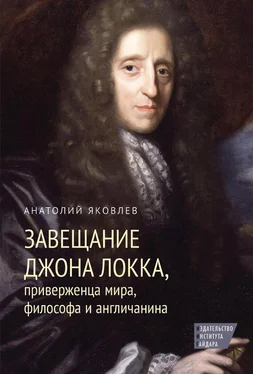

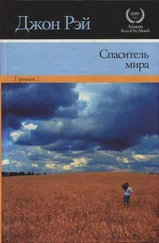

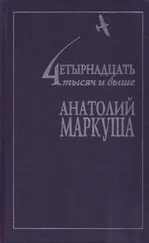


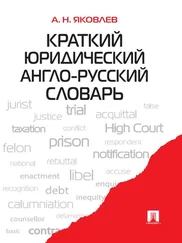
![Анатолий Ахутин - Философское уморасположение [Курс лекций по введению в философию] [litres]](/books/407742/anatolij-ahutin-filosofskoe-umoraspolozhenie-kurs-thumb.webp)
